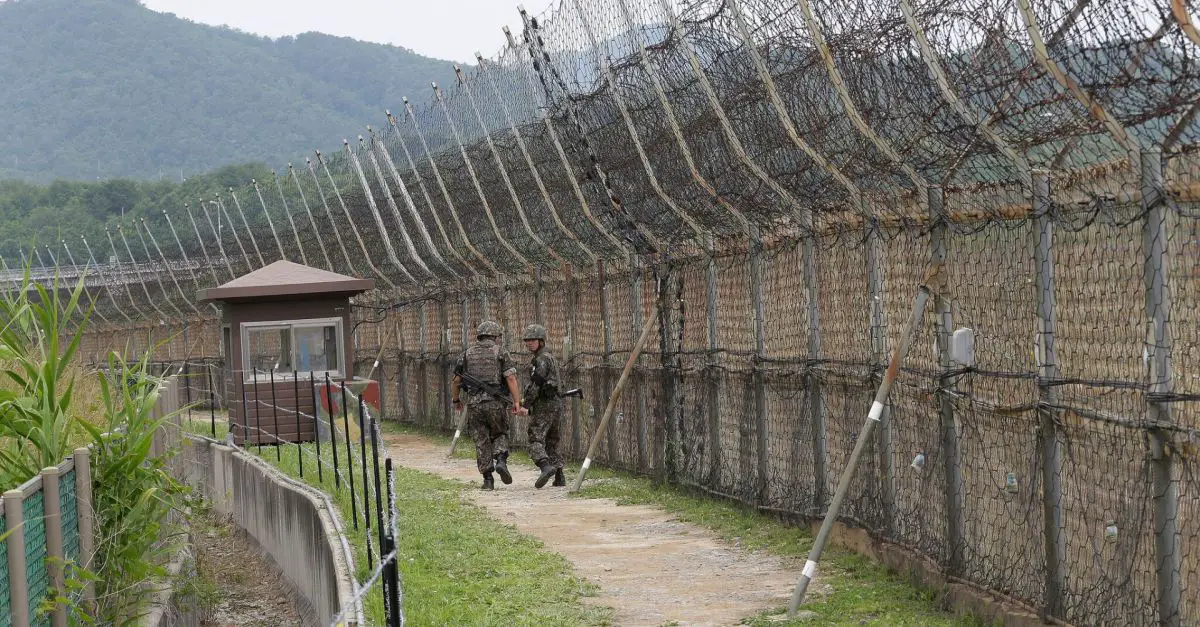Breaking news
South korea fires warning shots to North korean soldier after rise of border tensions.
The South Korean military stated that it fired warning shots after North Korean soldiers briefly crossed the border this week. Tensions in the region are high due to balloons carrying waste and propaganda campaigns.

Korean soldier patrolling alongside DMZ border (Picture source: AP )
The South Korean military said on Tuesday that it fired warning shots over the weekend after North Korean soldiers briefly crossed the border.
The South Korean Joint Chiefs of Staff (JCS) said in a statement that some North Korean soldiers working in the demilitarized zone on the central front briefly crossed the military demarcation line.
It was referring to the control line located at the heavily fortified border between the two Koreas.
"After our military issued warning messages and fired warning shots, they retreated to the north," the statement said, adding that the incident occurred on June 9. The JCS also announced that numerous soldiers are on alert, but after the shots were fired, the North Korean soldiers immediately returned to the northern side of the 53rd parallel.
What are the causes of tensions between the two Koreas?
The incident occurred in a context of increased tensions on the Korean peninsula following the launch by Pyongyang of balloons carrying waste such as cigarette butts and toilet paper to the South. The North stated that these balloons were a response to a campaign conducted by North Korean defectors in the South, who flew balloons carrying anti-Pyongyang leaflets in the opposite direction across the border.
In response to the trash balloons, the South Korean government also suspended this month a military agreement aimed at reducing tensions in 2018 and resumed propaganda broadcasts via loudspeakers along the border. This decision irritated Pyongyang, which warned that Seoul was creating "a new crisis."
A Crisis on the Rise
Although the two nations are technically at war because no peace treaty has been signed between the two states, a form of fragile peace was nevertheless in place. Although from time to time peaks of tension are felt, sometimes resulting in artillery or missile fire near the territories.
Recently, however, balloons from North Korea filled with waste arrived on South Korean territory. South Korea responded by broadcasting K-pop music and international news on gigantic loudspeakers, which is banned in North Korea.
Since then, tensions have increased significantly, with threats and posturing. Kim Yo Jong, the sister of North Korean leader Kim Jong Un, warned that the South was creating a "prelude to a very dangerous situation." North Korea then sent another wave of 300 balloons filled with waste overnight.
More than 1,000 balloons carrying garbage bags containing old papers, cigarette butts, and even feces have landed in recent weeks in northern provinces of South Korea. The North Korean leader officially declared, "I severely warn Seoul to immediately cease its dangerous activities that could further provoke a crisis of confrontation."
Additionally, official threats in the form of ultimatums were issued by Pyongyang: "If the Republic of Korea simultaneously proceeds with the distribution of leaflets and provocation by loudspeakers beyond the border, it will undoubtedly witness a new reaction from the DPRK."
In response to this provocation, Lee Sung Joon, spokesperson for the South Korean Joint Chiefs of Staff, said that Kim's comments represented an increased verbal threat from North Korea. The balloon battle began in mid-May when activists from the South, including North Korean defectors, sent numerous messages containing anti-Kim propaganda and USB drives with K-pop music to the North.
Seoul's broadcasts include global news and information on democratic and capitalist society, mixed with popular K-pop music. The sound from the loudspeakers could travel more than 20 kilometers (12.4 miles) into North Korea.
Tensions between the two countries have increased after the 2022 South Korean presidential election, which resulted in the inauguration of right-wing leader Yoon Suk Yeol. Yoon appears to take a tougher line on North Korea than his predecessors.
In recent years, North Korea has intensified its weapons tests, including missile and satellite launches. Last week, Pyongyang fired a barrage of missiles into the sea simulating an attack on South Korea. Some experts have speculated that North Korea will continue to escalate tensions until the U.S. presidential election in November.
























